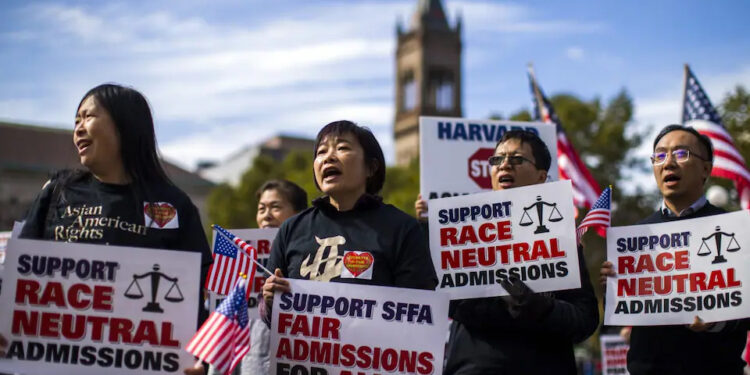Just as the Supreme Court of America is poised to make a historic decision that could potentially eliminate affirmative action from the university admissions process, contextual admissions promoting inclusivity are gaining traction in universities across the United Kingdom. The Telegraph has the story.
Any day now, America’s Supreme Court will rule in one of the country’s biggest cases since the pro-choice decision of Roe vs Wade. This time the issue is affirmative action, with positive discrimination in favour of African-American, Hispanic-American and Native American candidates likely to be banished from the university admissions process.
If the Supreme Court justices do rule against affirmative action it will mark the end of a 60-year campaign. The ruling comes just as “contextual admissions”, which aim to promote “inclusivity”, take off in U.K. universities.
The U.S. case is the work of Edward Blum, an investor turned legal strategist who believes that racial diversity quotas have fostered injustice, not equality. Using race as a tool by which to judge student admissions “harms everyone”, Blum, 71, says. “You cannot cure the racism of the past with new racism.”
Blum’s case is against Harvard (an Ivy League private university) and the University of North Carolina (which is state-funded), and claims that preferential treatment given to students of African-American, Hispanic-American or Native American heritage over those who are white or Asian-American violates the U.S. Constitution’s equal protection clause, and also appears to go against the 1964 civil rights act introduced by Lyndon B Johnson, which prohibits race-based discrimination.
One plaintiff is Jon Wang, an 18- year-old with exemplary test scores who was rejected by every elite university he applied to on what he believes are racial grounds. According to Students for Fair Admissions, the campaign group Blum set up in 2014, Wang would have had a 95% likelihood of getting into his chosen universities had he been African-American; those chances were slashed five-fold due to his Asian heritage. “Race in America is one of the most polarising issues we face,” Blum says. “It has no place in the admissions process.”
It is an argument which has a personal resonance for Blum, who is Jewish. Criteria for entry to Harvard were rewritten in 1922 to limit numbers of Jewish students, who then accounted for 21% of the institution’s intake – a group who, like Asian-American students today, received high grades yet suffered “demerits” in their face-to-face interviews.
“There is a straight line running from the anti-Semitism of the 1920s to the anti-Asian bias that we see at Harvard now,” Blum believes. Many of those losing out today are from working-class families, says Blum. They are not privileged candidates, he insists, but have parents who have laboured as hotel maids, or handymen.
Affirmative action is disrupting the university selection process in Britain, too. Here, however, the division lies along class, rather than race, lines, with the rebalancing act – known as “contextual admissions” – focusing on state school vs privately educated pupils.
In 2022, 68% of places at Oxford and 72.5% at Cambridge were awarded to state-school pupils – up from 57% and 61% in 2013 (93% of children in England and Wales are state-educated). Last summer, every place for law at Edinburgh University was awarded to students from deprived areas or disadvantaged schools: of 400 applicants living in the country’s poorest postcodes, 168 won a place, while the 555 hopefuls applying from the wealthiest 60% of areas failed to score a single one.
“There’s so much pressure to be able to say, ‘This year we’ve admitted 70% from state schools rather than 55,’” says David Abulafia, historian and life fellow at Gonville and Caius College, Cambridge. This criteria “is not useful if it results in people who are less capable and less well-qualified being admitted, rather than people who are real high-fliers.”
Worth reading in full.












To join in with the discussion please make a donation to The Daily Sceptic.
Profanity and abuse will be removed and may lead to a permanent ban.